Abstract
OBJECTIVES: To determine physicians' attitudes and reactions to their patients' use of alternative cancer therapies, factors that affect these reactions and physicians' views of how the use of such therapies affects the physician-patient relationship. DESIGN: Qualitative study involving in-depth semistructured interviews. SETTING: Toronto. PARTICIPANTS: Nineteen oncologists and 35 general practitioners (GPs) were selected by means of purposive sampling; 18 oncologists and 12 GPs agreed to participate. OUTCOME MEASURES: Attitudes and reactions to patients' use of alternative cancer therapies; factors affecting physicians' reactions to such use; and physicians' views of how the use of such therapies affects the physician-patient relationship. RESULTS: Many physicians perceived themselves to be unfamiliar with available alternative cancer therapies and indicated that their main sources of information were their patients and the lay press. Although most of the physicians viewed the efficacy of such therapies as scientifically unproven, they would respect their patients' decision to use them and encourage them to continue with standard treatment. Factors found to influence the physicians' reactions included the prognosis with standard treatments, the exclusivity of the use of alternative therapies and whether the alternative therapies were harmful. Although many of the participants felt that a patient's use of alternative cancer therapies did not affect the physician-patient relationship, a few indicated that it did cause some tension. CONCLUSION: Because many physicians lack information on alternative cancer therapies and most of these therapies have not been scientifically proven, physicians' attitudes and reactions to their use by patients are influenced to a greater degree by the efficacy or inefficacy of standard treatment and the invasiveness of the alternative therapy than by the efficacy of the alternative therapy used.
Full text
PDF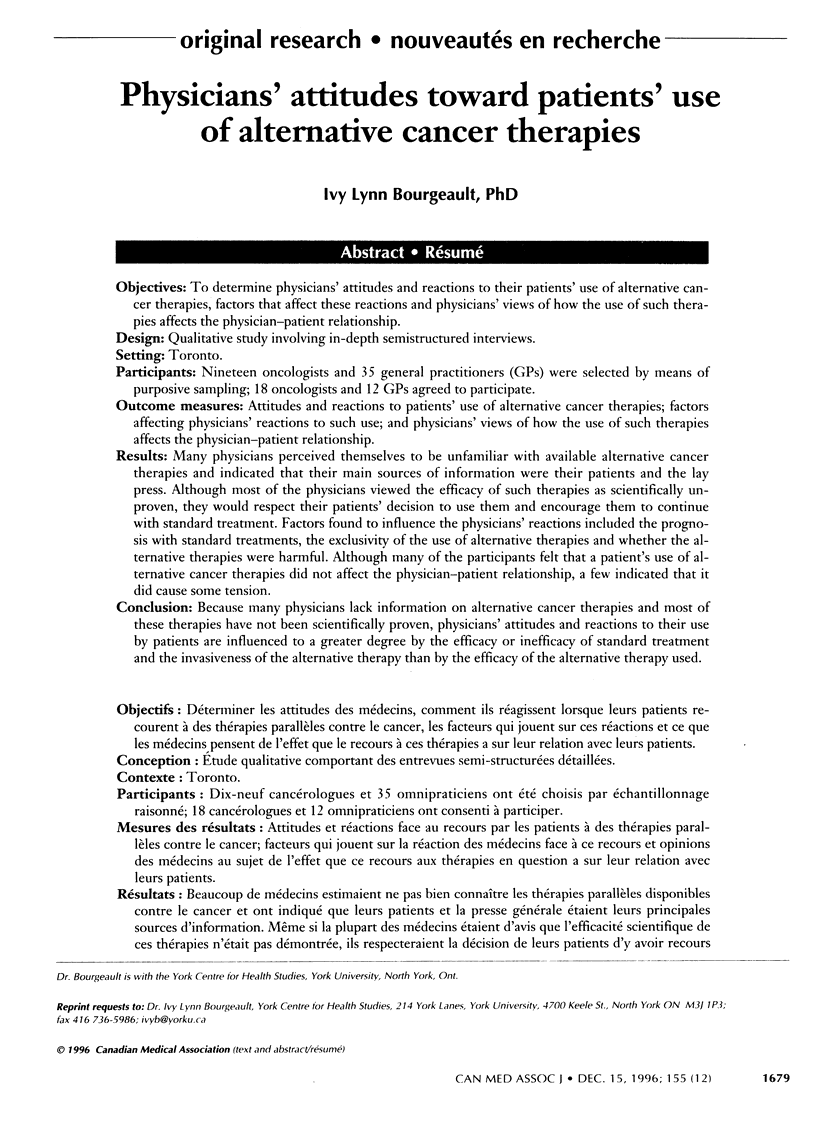
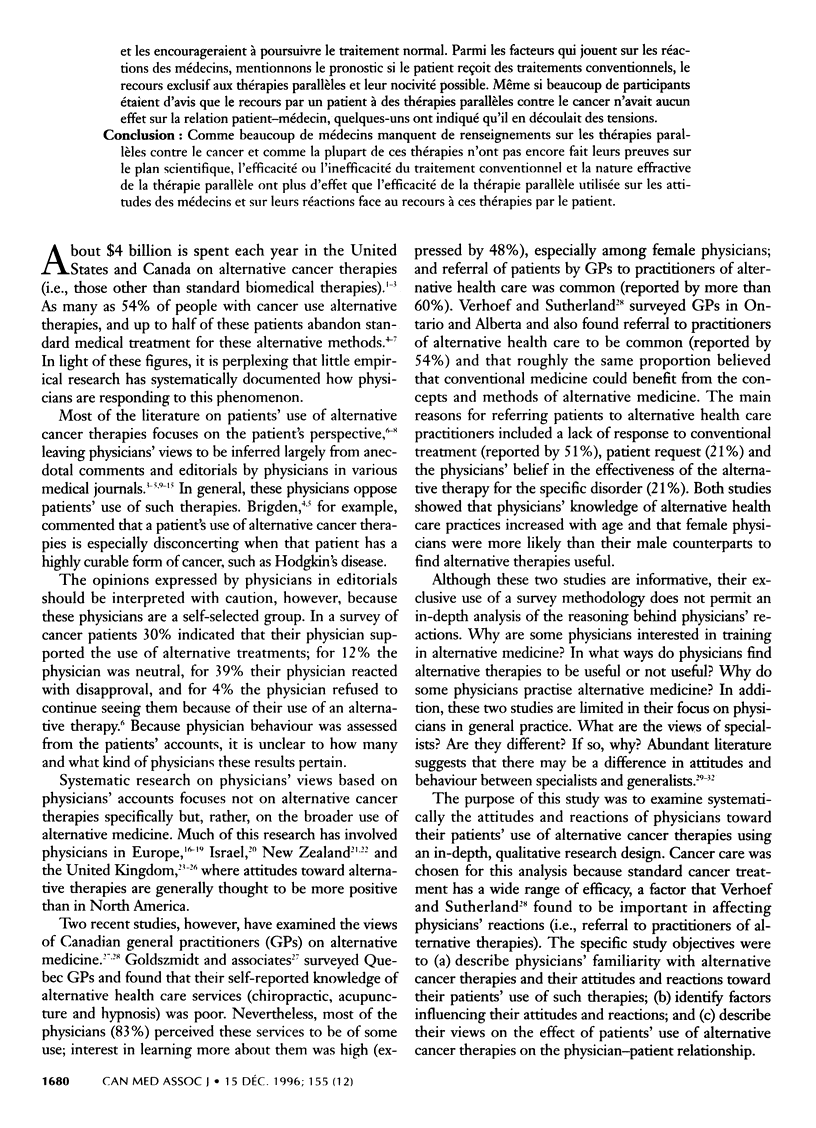
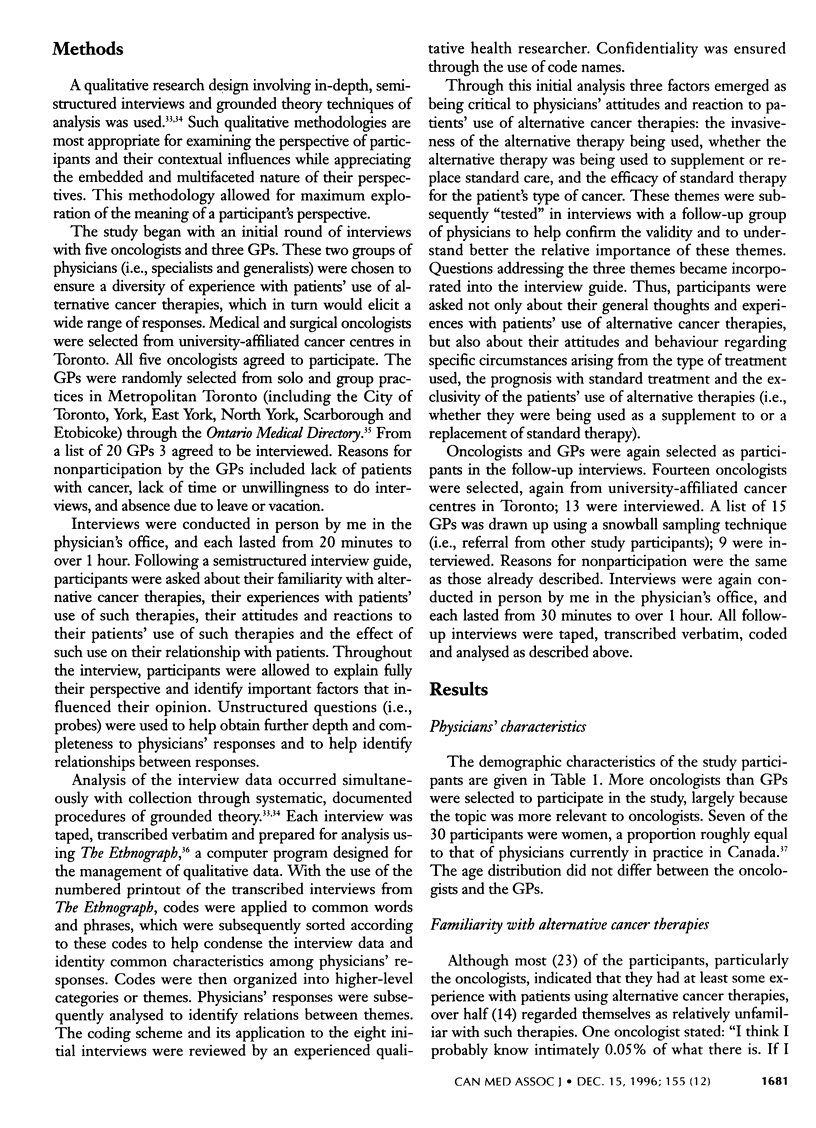
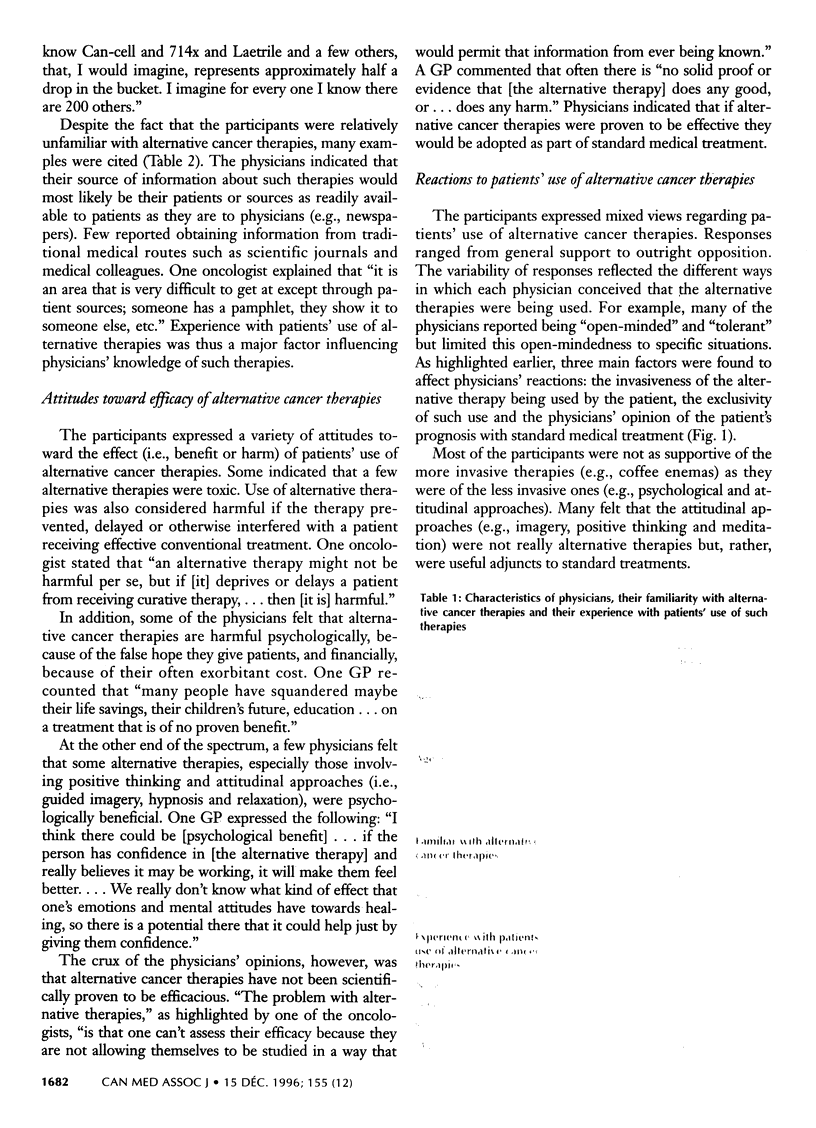
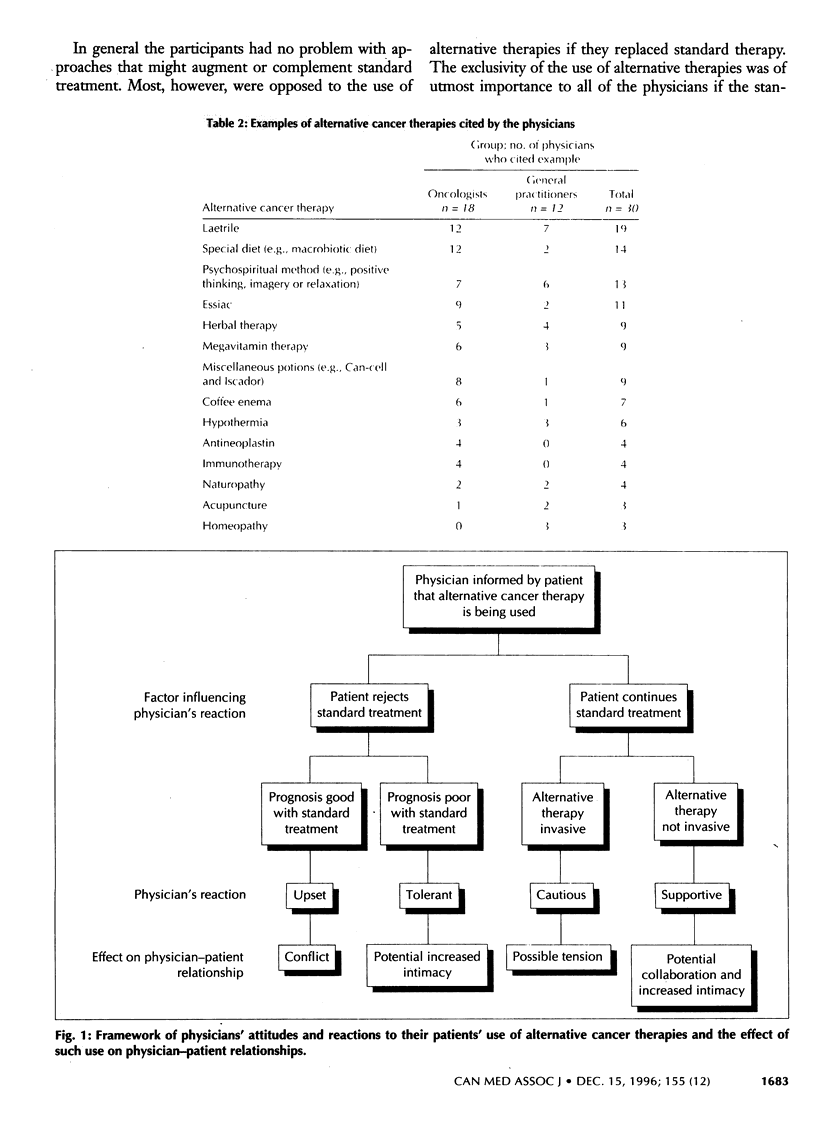
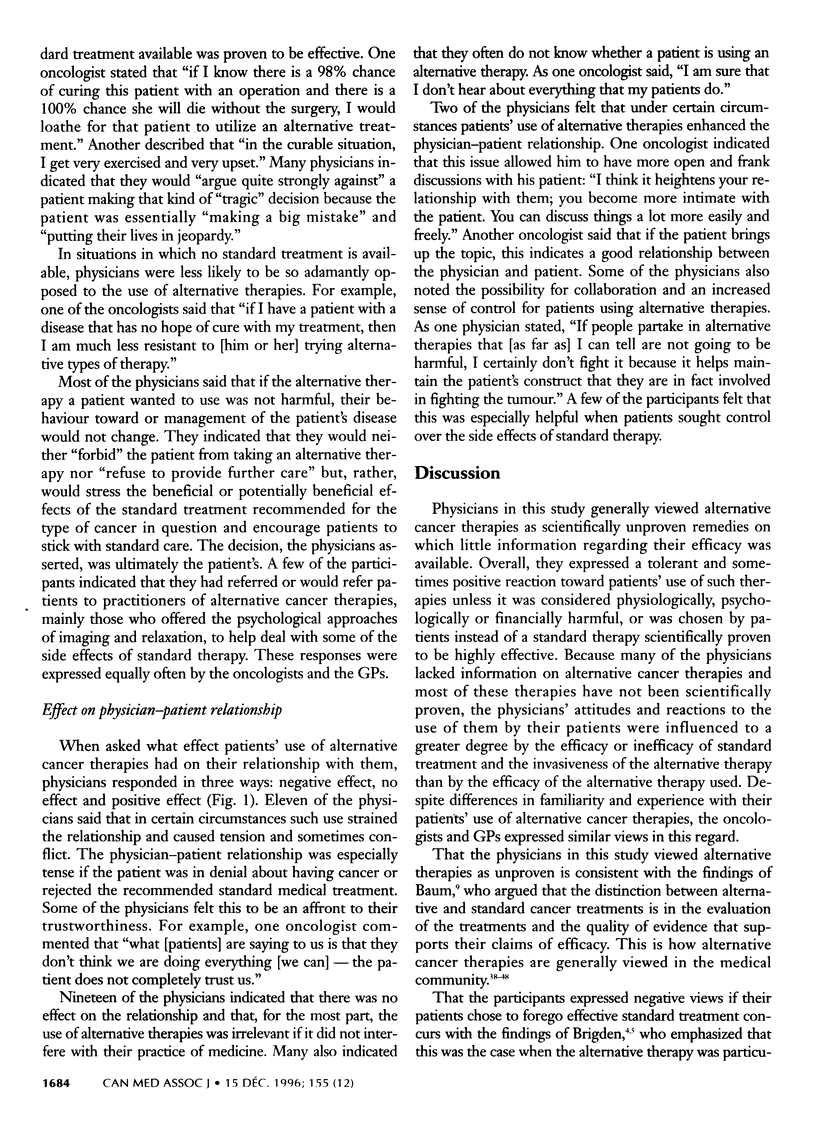
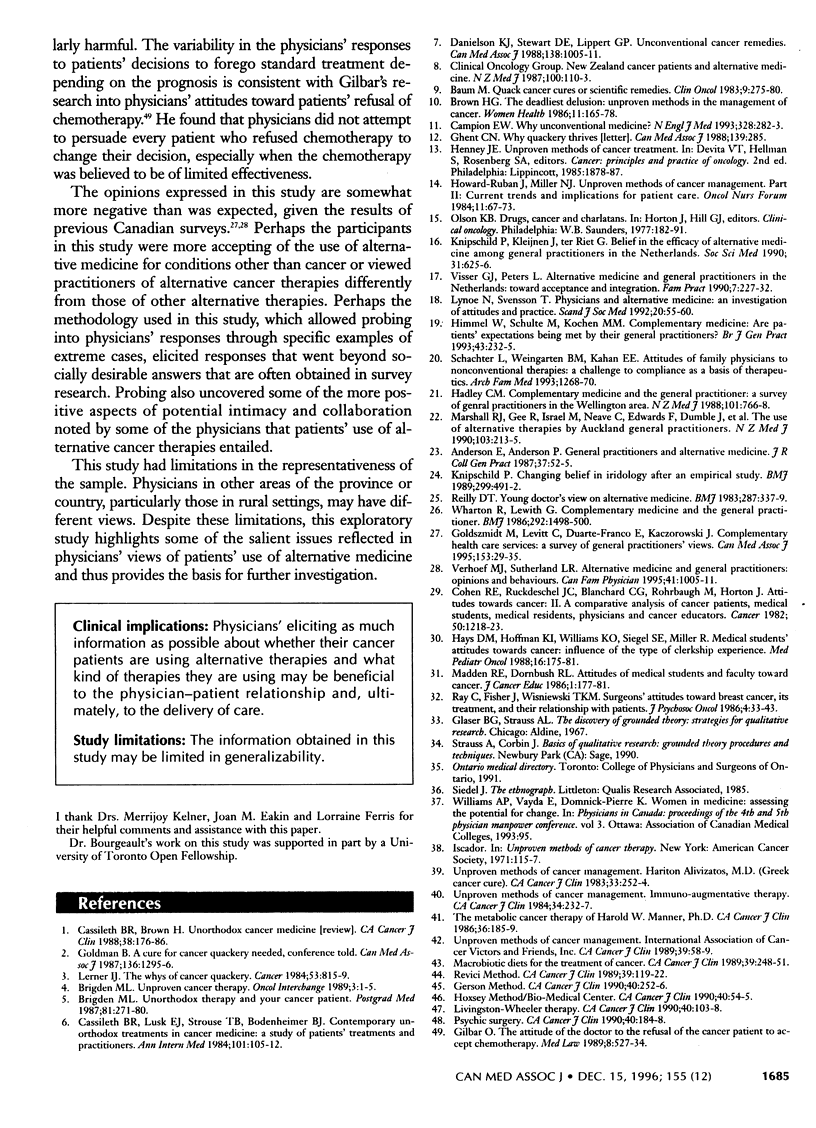
Selected References
These references are in PubMed. This may not be the complete list of references from this article.
- Anderson E., Anderson P. General practitioners and alternative medicine. J R Coll Gen Pract. 1987 Feb;37(295):52–55. [PMC free article] [PubMed] [Google Scholar]
- Baum M. Quack cancer cures or scientific remedies? Clin Oncol. 1983 Dec;9(4):275–280. [PubMed] [Google Scholar]
- Brown H. G. The deadliest delusion: unproven methods in the management of cancer. Women Health. 1986 Fall-Winter;11(3-4):165–178. [PubMed] [Google Scholar]
- Campion E. W. Why unconventional medicine? N Engl J Med. 1993 Jan 28;328(4):282–283. doi: 10.1056/NEJM199301283280413. [DOI] [PubMed] [Google Scholar]
- Cassileth B. R., Brown H. Unorthodox cancer medicine. CA Cancer J Clin. 1988 May-Jun;38(3):176–186. doi: 10.3322/canjclin.38.3.176. [DOI] [PubMed] [Google Scholar]
- Cassileth B. R., Lusk E. J., Strouse T. B., Bodenheimer B. J. Contemporary unorthodox treatments in cancer medicine. A study of patients, treatments, and practitioners. Ann Intern Med. 1984 Jul;101(1):105–112. doi: 10.7326/0003-4819-101-1-105. [DOI] [PubMed] [Google Scholar]
- Danielson K. J., Stewart D. E., Lippert G. P. Unconventional cancer remedies. CMAJ. 1988 Jun 1;138(11):1005–1011. [PMC free article] [PubMed] [Google Scholar]
- Ghent C. N. Why quackery thrives. CMAJ. 1988 Aug 15;139(4):285–285. [PMC free article] [PubMed] [Google Scholar]
- Gilbar O. The attitude of the doctor to the refusal of the cancer patient to accept chemotherapy. Med Law. 1989;8(5):527–534. [PubMed] [Google Scholar]
- Goldszmidt M., Levitt C., Duarte-Franco E., Kaczorowski J. Complementary health care services: a survey of general practitioners' views. CMAJ. 1995 Jul 1;153(1):29–35. [PMC free article] [PubMed] [Google Scholar]
- Hadley C. M. Complementary medicine and the general practitioner: a survey of general practitioners in the Wellington area. N Z Med J. 1988 Nov 9;101(857):766–768. [PubMed] [Google Scholar]
- Hays D. M., Hoffman K. I., Williams K. O., Siegel S. E., Miller R. Medical students' attitudes towards cancer: influence of the type of clerkship experience. Med Pediatr Oncol. 1988;16(3):175–181. doi: 10.1002/mpo.2950160305. [DOI] [PubMed] [Google Scholar]
- Himmel W., Schulte M., Kochen M. M. Complementary medicine: are patients' expectations being met by their general practitioners? Br J Gen Pract. 1993 Jun;43(371):232–235. [PMC free article] [PubMed] [Google Scholar]
- Howard-Ruben J., Miller N. J. Unproven methods of cancer management. Part II: Current trends and implications for patient care. Oncol Nurs Forum. 1984 Jan-Feb;11(1):67–73. [PubMed] [Google Scholar]
- Knipschild P. Changing belief in iridology after an empirical study. BMJ. 1989 Aug 19;299(6697):491–492. doi: 10.1136/bmj.299.6697.491. [DOI] [PMC free article] [PubMed] [Google Scholar]
- Knipschild P., Kleijnen J., ter Riet G. Belief in the efficacy of alternative medicine among general practitioners in The Netherlands. Soc Sci Med. 1990;31(5):625–626. doi: 10.1016/0277-9536(90)90099-e. [DOI] [PubMed] [Google Scholar]
- Lerner I. J. The whys of cancer quackery. Cancer. 1984 Feb 1;53(3 Suppl):815–819. doi: 10.1002/1097-0142(19840201)53:3+<815::aid-cncr2820531334>3.0.co;2-u. [DOI] [PubMed] [Google Scholar]
- Lynöe N., Svensson T. Physicians and alternative medicine--an investigation of attitudes and practice. Scand J Soc Med. 1992 Mar;20(1):55–60. doi: 10.1177/140349489202000111. [DOI] [PubMed] [Google Scholar]
- Madden R. E., Dornbush R. L. Attitudes of medical students and faculty toward cancer. J Cancer Educ. 1986;1(3):177–181. doi: 10.1080/08858198609527830. [DOI] [PubMed] [Google Scholar]
- Marshall R. J., Gee R., Israel M., Neave D., Edwards F., Dumble J., Wong S., Chan C., Patel R., Poon P. The use of alternative therapies by Auckland general practitioners. N Z Med J. 1990 May 9;103(889):213–215. [PubMed] [Google Scholar]
- Reilly D. T. Young doctors' views on alternative medicine. Br Med J (Clin Res Ed) 1983 Jul 30;287(6388):337–339. doi: 10.1136/bmj.287.6388.337. [DOI] [PMC free article] [PubMed] [Google Scholar]
- Schachter L., Weingarten M. A., Kahan E. E. Attitudes of family physicians to nonconventional therapies. A challenge to science as the basis of therapeutics. Arch Fam Med. 1993 Dec;2(12):1268–1270. doi: 10.1001/archfami.2.12.1268. [DOI] [PubMed] [Google Scholar]
- Verhoef M. J., Sutherland L. R. Alternative medicine and general practitioners. Opinions and behaviour. Can Fam Physician. 1995 Jun;41:1005–1011. [PMC free article] [PubMed] [Google Scholar]
- Visser G. J., Peters L. Alternative medicine and general practitioners in The Netherlands: towards acceptance and integration. Fam Pract. 1990 Sep;7(3):227–232. doi: 10.1093/fampra/7.3.227. [DOI] [PubMed] [Google Scholar]
- Wharton R., Lewith G. Complementary medicine and the general practitioner. Br Med J (Clin Res Ed) 1986 Jun 7;292(6534):1498–1500. doi: 10.1136/bmj.292.6534.1498. [DOI] [PMC free article] [PubMed] [Google Scholar]


